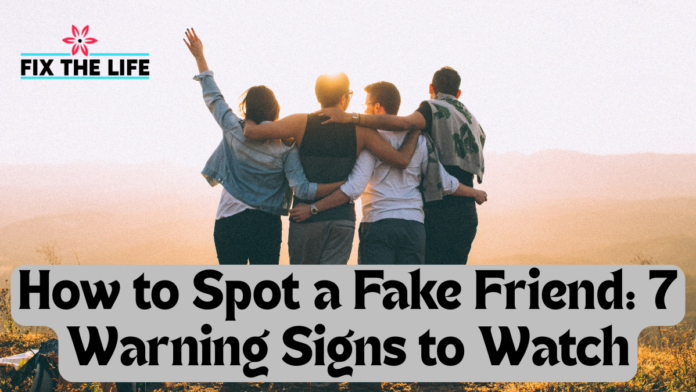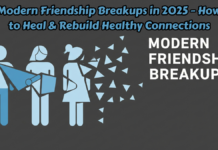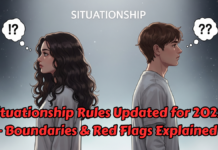Friendships are supposed to uplift, support, and bring joy. But sometimes, not every connection is as genuine as it seems. While many people focus on spotting toxic relationships in dating, unhealthy friendships can quietly drain your energy too. Knowing the signs of a fake friend can save you from years of one-sided loyalty, betrayal, or emotional stress.
If you’ve ever walked away from a conversation with someone feeling worse than when it started, or questioned whether your so-called friend truly has your back, it might be time for a reality check. Here are seven clear friendship red flags to watch for — and what to do about them.
Signs Of A Fake Friend: Friendship Red Flags
1. They Only Reach Out When They Need Something
One of the biggest signs of a fake friend is when the relationship feels transactional. If someone only contacts you when they want a favor, advice, or something for themselves but disappears the moment you need them, that’s a red flag.
Example: They’re eager to call when they need a ride, money, or emotional support but go radio silent when you’re going through a tough time.
What to do: Take note of the imbalance and start setting firmer boundaries with your time and energy.
2. They Can’t Celebrate Your Success
True friends cheer you on. Fake friends, however, may act disinterested, downplay your achievements, or even get passive-aggressive when things go well for you.
Example: You land a new job or relationship, and instead of celebrating, they immediately change the subject or offer a backhanded compliment like “Must be nice for some people.”
What to do: Surround yourself with people who genuinely support your wins without resentment.
3. They Gossip About You Behind Your Back
One of the clearest friendship red flags is hearing from others that your “friend” has been badmouthing you. A trustworthy friend defends you when you’re not around — they don’t tear you down.
What to do: Address the situation directly if you feel comfortable, or quietly distance yourself if the behavior continues.
4. They Drain Your Energy, Not Lift It
Friendships should leave you feeling heard, valued, and uplifted. If every interaction with someone leaves you anxious, irritated, or exhausted, it’s a major warning sign.
Example: They constantly complain, criticize your choices, or bring drama into every conversation, leaving you emotionally depleted.
What to do: Limit your time with emotionally draining people and prioritize relationships that feel reciprocal and positive.
5. They’re Never There During Your Hard Times
It’s easy to stick around when things are good — the real test of friendship comes when life gets tough. A fake friend often disappears or becomes distant when you need them most.
Example: You’re grieving a loss, dealing with a breakup, or facing a health issue, and they offer little to no emotional support.
What to do: Recognize who consistently shows up for you, and value those connections more.
6. They Compete With You Constantly
Healthy friendships involve mutual support, not silent competition. If someone regularly one-ups your stories, subtly competes with your achievements, or treats everything as a contest, it’s a toxic dynamic.
Example: You mention a new hobby, and they immediately claim to have done it better or longer.
What to do: Limit how much personal information you share and steer conversations toward supportive topics.
7. They Disrespect Your Boundaries
Fake friends often push past your comfort zones or disregard your feelings and limits. Whether it’s invading your privacy, showing up uninvited, or constantly making you feel guilty for saying no — it’s not okay.
What to do: Communicate your boundaries clearly. If they continue to ignore them, it may be time to reevaluate the relationship.
FAQ
Q1: How can I tell the difference between a fake friend and a flawed one?
A: Everyone makes mistakes, but a fake friend consistently disrespects your boundaries, gossips, or makes you feel worse about yourself over time.
Q2: Can a fake friend change?
A: It’s possible, but only if they’re aware of their behavior and genuinely want to improve. Consistent actions matter more than promises.
Q3: Is it okay to distance myself from a long-time friend?
A: Yes. Longevity doesn’t excuse toxic behavior. Protecting your mental health and emotional peace should always come first.
Q4: How do I confront a fake friend?
A: Be honest, clear, and calm. Use “I feel” statements to express how their actions affect you, and set firm boundaries moving forward.
Q5: Can toxic friendships impact mental health?
A: Absolutely. Consistently negative or draining friendships can increase stress, anxiety, and feelings of isolation. Prioritizing healthy connections is crucial.
Final Thoughts
Recognizing the signs of a fake friend isn’t about being cynical — it’s about protecting your peace. Friendships should uplift and support you, not weigh you down. Keep these friendship red flags in mind, and don’t hesitate to create space for relationships that truly nurture your growth.




